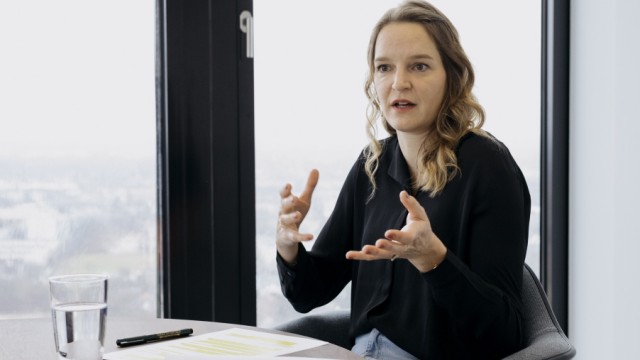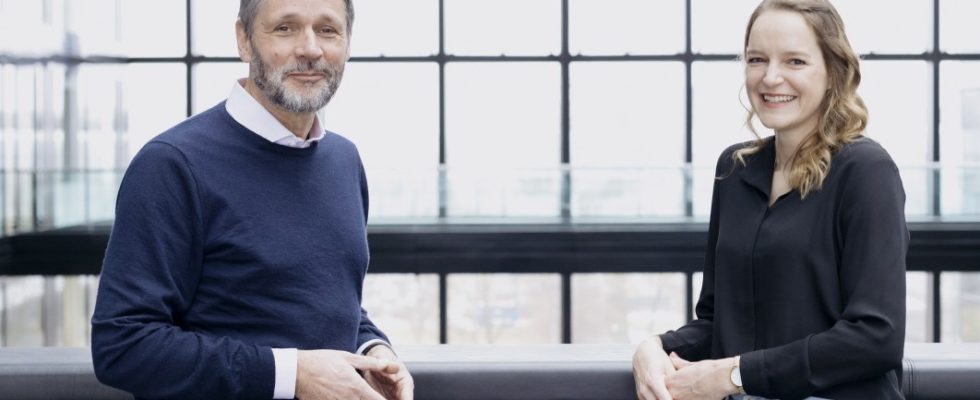SZ: For its birthday, the SZ relief organization is giving itself a present: a new name. The SZ Advent calendar becomes the SZ Good Works. Why?
Karl Ulrich: We didn’t make this decision lightly. The topic really bothered us for a long time. Why have we discussed it for so long? On the one hand, we are very proud of what we have: the Advent calendar is an established, well-known institution. You don’t like to change something like that. But the name has a downside. When you hear it for the first time you might think: Ah, this is something that happens every December. Our long-term donors and all recipients know that this is not the case, that we do good things all year round. This is exactly what we want to clearly signal to people who come into contact with us for the first time in the future.
Will anything change with the name?
Sandra Geisler: No, we just want to become clearer to the outside world, the core remains untouched. We will continue to do the good works here, in Munich and the immediate surroundings, the home of the SZ and most of the SZ readers. Every euro that is donated goes directly to those who need help, without any deductions. We remain a manageable and efficient team; all administrative costs continue to be borne by Süddeutsche Verlag.
How did the process of finding the new name go?
Ulrich: Over years. The feeling that the term “Advent” no longer really fits has gradually grown. At some point we thought: the anniversary would be a good reason to say goodbye to him. You can look back on what you have achieved and at the same time send a signal that points to the future.
Geisler: We were very thorough because we really wanted to involve everyone who cares about the topic – and that includes many in the editorial team and in the publishing house. Sensitivity is important here. We held various workshops internally, first we brainstormed, then we involved employees from a wide variety of departments in order to get as many perspectives and points of view as possible. At the end there was an official survey. So the ideas became more and more pointed and sharpened. A professional naming agency then evaluated them, so we ultimately asked the readers with some concrete suggestions on various channels. SZ Gute Works was ultimately the clear favorite.
Ulrich: Which from my point of view just fits. Because it builds a wonderful bridge: The good works were also part of the club’s previous name, which read in full: “Advent calendar for the good works of the South German newspaper eV”. SZ Gute Werke makes it clear where we come from, what we will always stand for, and at the same time it is clear, slim and modern.
Geisler: What is also important: SZ Gute Works works in all communication channels, including social media. These are also becoming increasingly important for non-profit organizations.
The SZ relief organization was born 75 years ago, in the immediate aftermath of the Second World War. Why is the idea still relevant today?
Ulrich: Because help will always remain timely. Compared to the post-war period, the situation has – fortunately – changed significantly. But there are still many people in need of help, even in an inherently wealthy city like Munich with such a prosperous surrounding area. Precisely because so many people are doing quite well, there is a certain risk that those in need will slip out of sight. But they exist. The gap between the wealthy and the anything-but-wealthy is growing larger and, in my opinion, sometimes sharper. This is precisely why it is so important to show solidarity, to promote solidarity, to organize solidarity. That’s what we want. This solidarity – that is our constant.
Karl Ulrich, first chairman of the sponsoring association.
(Photo: Julius Schien)
Geisler: We help in very different ways: We support organizations, we provide assistance on a case-by-case basis. Whenever we learn again and again that there is direct need and how great it sometimes is, emergency aid comes into play. We are simply faster and can provide more direct and comprehensive support than the authorities. We will never be able to make the state social system superfluous and we don’t want to. But the emergency aid in particular shows how important it is that we supplement it.
Can trends be observed?
Geisler: Over the years, the need to escape has always played a role. People who have to leave their homeland to escape wars often have nothing more than their bare lives at first. What we have recently observed: poverty in old age is becoming more serious. And inflation has brought financial difficulties to households that one would not have expected some time ago.
Ulrich: The issues we deal with have gradually changed over the decades. What I think is great: how diverse our donors have remained over all this time. The idea from the start was: everyone gives what they can. Even small contributions are important. Every donation, no matter how large, is equally recognized. Fortunately, the large donations have increased over the years, but the small ones have not decreased. We are a reflection of society as a whole. I think that – key word solidarity – is very important.
The Good Works are organized under the umbrella of the SZ. Formally, there is an association that supports the aid organization and which you, Mr. Ulrich, head. The processing is primarily handled by you, Ms. Geisler, as managing director, and your two employees. How should we concretely imagine working together?
Ulrich: Well coordinated – at the same time we can continue to improve. The association guarantees non-profit status, also because it is regularly audited. The team paid by the publisher takes care of the actual implementation. In principle, we are all just trustees: we accept the money that SZ readers entrust to us and ensure that as many good works as possible are done with it. In order for this to run as quickly and directly as possible, it is first of all important that there are not too many hands in play. On the other hand, you also have to make sure that the money actually goes where it is needed and is used for a good cause. To accomplish both tasks, what we have is the ideal structure.
Geisler: We decide on every application according to the multiple-heads principle in our regular award meetings. Every major donation is discussed together with our club representatives. What is important to us: that it is listed exactly what is being applied for. After a certain period of time, we will check whether the donation is being used appropriately. We also don’t have an automatic continuation process according to the motto: We would like to have the same thing as last year again. Even organizations with which we have been working for a long time must continually submit careful new applications. This means a little more work, but it guarantees that readers can be sure that their money is really being used for good.

Sandra Geisler, Managing Director.
(Photo: Julius Schien)
Ms. Geisler, you joined the team last year, but previously worked in the foundation sector. What is important these days to stay up to date as a nonprofit organization?
Geisler: Transparency, sustainability, digitalization. People want to know exactly what is happening with their money. If you want to do good, you want to be able to do it at any time and from anywhere. Digital payment models help with this. Digital applications help ensure that help arrives quickly. And the issue of sustainability doesn’t just apply to the ecological level.
Rather?
Geisler: Quite generally, for example also for social-educational concepts. These are also constantly being developed further, and when we promote something, we always look: Is there perhaps something new? Something that emphasizes helping people to help themselves more than just alleviating distress. The issue of sustainability is there just as much, but it is not as noticeable as when purchasing electric cars for aid organizations or the ecological interior design of a care unit for dementia patients.
For your birthday: what do you want?
Geisler: Lots of enthusiasm. With the new name we want to become even better known and, in particular, inspire many young people to join us. We want to be visible all year round and engage in even more exchange with our projects – with donors, the SZ employees and also with other organizations.
Ulrich: I hope that we can win the next generation over to our idea of solidarity. That we pass on the much that has been built and thus continue to inspire new good works. So that we really have a lasting impact.

